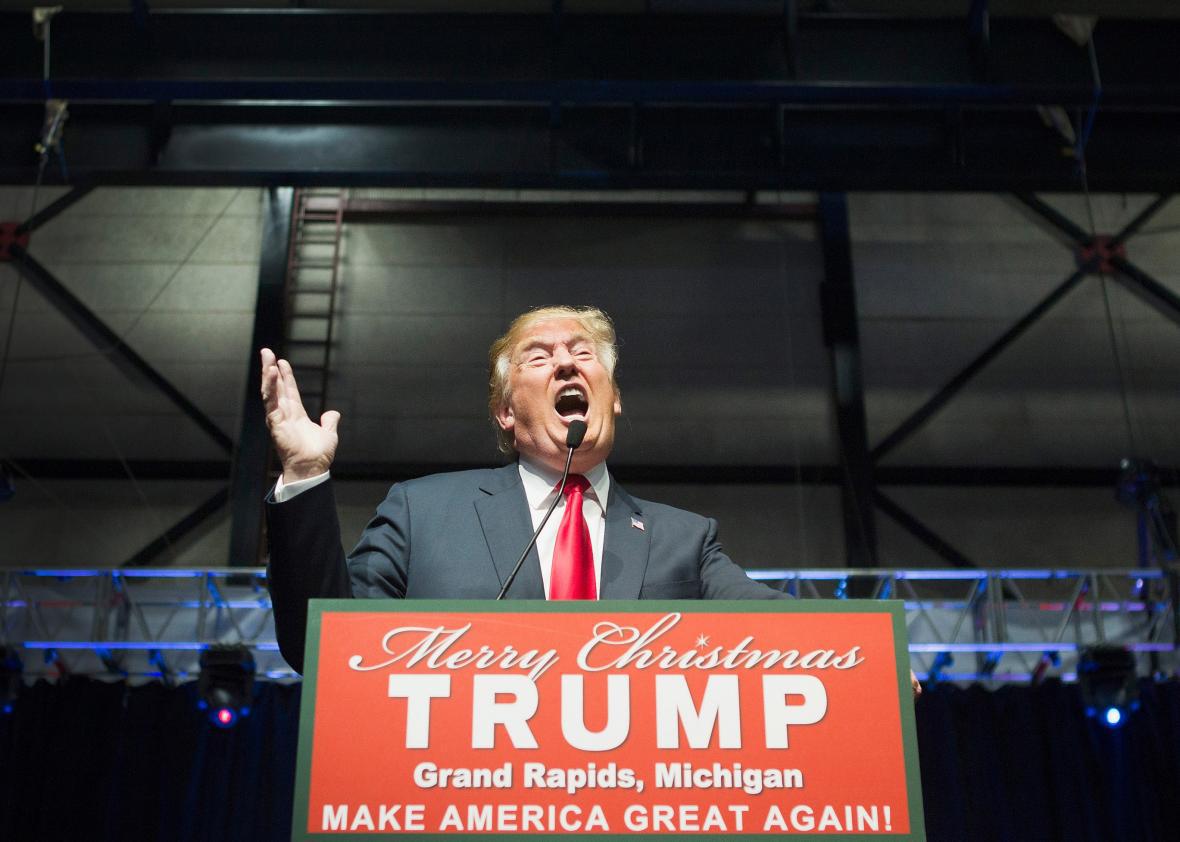On Monday, Republican front-runner Donald Trump told the Wall Street Journal that, if elected president, he would cut funds to the Department of Education and the Environmental Protection Agency:
Education policy … should be returned to the states, and he said he would end the Common Core education standards, which conservatives view as federal overreach.
“Education should be local and locally managed,” said Mr. Trump, who also attacked the administration’s environmental policies. “The Environmental Protection Agency is the laughingstock of the world.”
Back in October, Trump targeted the same two agencies in even stronger language, as the Huffington Post reported at the time:
“No, I’m not cutting services, but I’m cutting spending. But I may cut Department of Education. I believe Common Core is a very bad thing. I believe that we should be—you know, educating our children from Iowa, from New Hampshire, from South Carolina, from California, from New York. I think that it should be local education,” Trump said.
So the Department of Education is one,” he continued. “Environmental Protection, what they do is a disgrace. Every week they come out with new regulations.”
Trump, though perhaps a late-blooming Republican, is learning the lingo well, for hating on the federal Department of Education has long been a favorite hobbyhorse of leading GOP candidates. The department only became a Cabinet-level agency in 1980, at the end of Jimmy Carter’s presidency; as soon as Ronald Reagan took the reins, he vowed to close it down.
And since everything Reagan did (except, you know, increasing taxes and supporting background checks over assault weapons and offering amnesty to undocumented immigrants) is manifestly awesome, many of his worshipful GOP successors—with the very prominent exception of George W. Bush—have energetically taken up the Department of Education–hating mantle. In the previous election, Texas Gov. Rick Perry, with characteristic lyricism, vowed to abolish the agency, along with some other really hard-to-remember stuff: “It’s three agencies of government when I get there that are gone: Commerce, Education, and the, uh… what’s the third one there?”
In this cycle, pretty much everyone who’s anyone in the GOP field has gotten on board with the call to abolish or at least seriously starve the Department of Education. Of the contenders recently relegated to the JV debate table, Carly Fiorina—once an outspoken supporter of federal education policies like No Child Left Behind and even Obama’s Race to the Top—told the Christian Post last year that “the bigger our education department becomes, the worse our public education becomes.” The ever-consistent Rand Paul has never had much use for Washington’s education bureaucracy; in 2014, he said, “I don’t think you’d notice if the whole department was gone tomorrow.”
And so on and so forth. Florida Sen. Marco Rubio has said, “I honestly think we don’t need a Department of Education,” while Texas Sen. Ted Cruz has frequently applied one of his favorite verbs, “abolish,” to the Department of Education, which ranks No. 2 on his “Five for Freedom” list, after the IRS and before the Department of Energy (the “Washington Cartel”), the Department of Commerce (the “congressional cookie jar”), and the Department of Housing and Urban Development. President Cruz would “return education to those who know our students best: parents, teachers, local communities, and states.”
Other candidates have suggested tweaks to the department in its current form. For example: In October, Ben Carson said that, when he becomes president, he’ll use the Department of Education “to monitor our institutions of higher education for extreme political bias and deny federal funding if it exists.”
And New Jersey Gov. Chris Christie, though a prominent flip-flopper on the Common Core, has directed more of his ire toward teachers unions than the Department of Education, which he has never promised to eliminate (yet!). Ditto for everyone’s favorite “education governor,” Jeb Bush, who has come out for a “limited” federal role in education:
It should work to create transparency so that parents can see how their local schools measure up; it should support policies that have a proven record; and it should make sure states can’t ignore students who need extra help. That’s it.
Is that it for Donald Trump, too? It will be interesting to watch what the real-estate mogul’s continuing evolution brings us on the education front. The man who in 2004 said “I probably identify more as a Democrat” might deviate from the GOP on many issues, but when he’s doing a fine job of echoing his new party’s scorn for big-government education.
